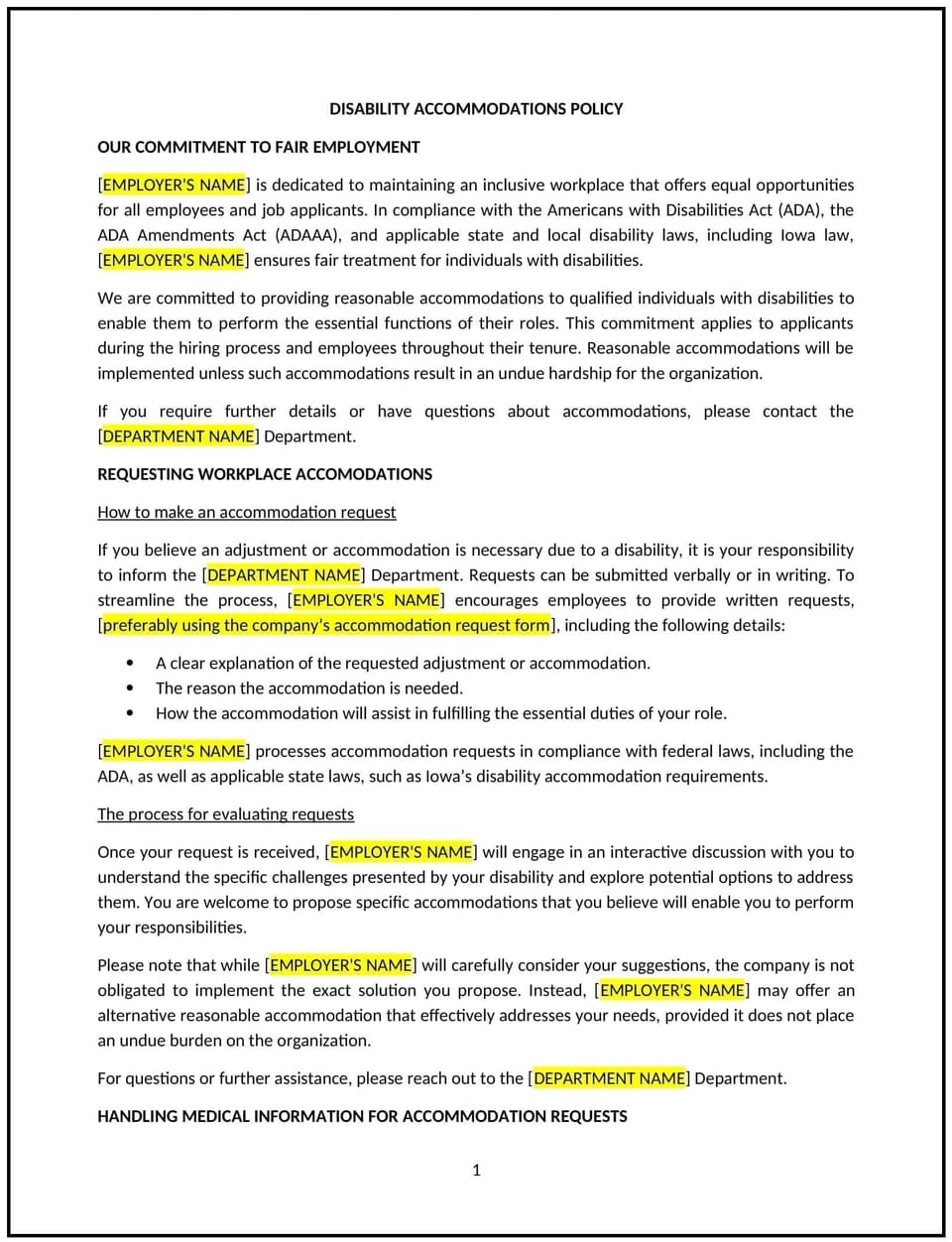Disability accommodations policy (Iowa): Free template

Disability accommodations policy (Iowa)
A disability accommodations policy helps Iowa businesses provide equal opportunities for employees with disabilities by outlining procedures for requesting and implementing reasonable workplace adjustments. Accommodations may include modified workstations, flexible schedules, assistive technology, or other support to help employees perform their job duties effectively.
This policy establishes clear guidelines for handling accommodation requests, evaluating needs, and ensuring that employees receive the necessary support. It helps businesses create an inclusive and accessible work environment while managing operational requirements.
By implementing this policy, businesses in Iowa can support employees with disabilities, improve workplace accessibility, and foster an inclusive company culture.
How to use this disability accommodations policy (Iowa)
- Define accommodation eligibility: Specify that all employees with disabilities, whether temporary or permanent, may request accommodations.
- Establish request procedures: Require employees to submit accommodation requests in writing, detailing their needs and any supporting documentation.
- Outline the evaluation process: Determine how accommodation requests will be reviewed, including discussions with employees and any required assessments.
- Identify available accommodations: Provide examples of reasonable workplace adjustments, such as ergonomic equipment, schedule modifications, or remote work options.
- Designate responsible personnel: Assign HR or a designated accommodations coordinator to manage requests and facilitate accommodations.
- Maintain confidentiality: Ensure that all requests and related discussions are handled discreetly and shared only with authorized personnel.
- Encourage open communication: Promote a collaborative approach to finding solutions that meet both employee needs and business operations.
- Review and update: Regularly assess accommodation practices to align with evolving business needs and accessibility standards.
Benefits of using this disability accommodations policy (Iowa)
This policy offers several advantages for Iowa businesses:
- Supports an inclusive workplace: Encourages accessibility and equal opportunities for employees with disabilities.
- Improves employee productivity: Provides necessary adjustments to help employees perform their job duties effectively.
- Reduces workplace barriers: Addresses challenges that employees with disabilities may face in their work environment.
- Strengthens employee retention: Creates a supportive culture that helps retain valuable talent.
- Encourages proactive problem-solving: Establishes a clear process for evaluating and implementing accommodations.
- Enhances workplace morale: Demonstrates a commitment to diversity, equity, and inclusion.
Tips for using this disability accommodations policy (Iowa)
- Communicate the process clearly: Businesses should ensure employees understand how to request accommodations and whom to contact.
- Train managers on accommodation procedures: Businesses should educate supervisors on how to handle requests professionally and support employees effectively.
- Evaluate accommodations individually: Businesses should assess each request on a case-by-case basis to determine appropriate adjustments.
- Provide flexible solutions: Businesses should explore different accommodation options to find solutions that work for both employees and the company.
- Maintain privacy protections: Businesses should handle all accommodation requests and medical information with discretion.
- Monitor effectiveness: Businesses should review accommodations periodically to ensure they continue to meet employee needs.
Q: Why should Iowa businesses implement a disability accommodations policy?
A: Businesses should establish this policy to create an inclusive work environment, support employees with disabilities, and promote equal opportunities.
Q: How should businesses handle accommodation requests?
A: Businesses should require written requests, evaluate needs on a case-by-case basis, and collaborate with employees to determine effective solutions.
Q: What types of accommodations should businesses consider?
A: Businesses should consider modified workstations, flexible schedules, remote work options, assistive technology, and other adjustments based on employee needs.
Q: Who is responsible for approving accommodations?
A: Businesses should assign HR representatives or designated accommodation coordinators to review and approve requests.
Q: How can businesses maintain confidentiality when handling accommodation requests?
A: Businesses should restrict access to medical and accommodation-related information to authorized personnel only.
Q: How often should businesses review their disability accommodations policy?
A: Businesses should update the policy annually or as workplace accessibility needs evolve.
Q: Can businesses deny an accommodation request?
A: Businesses should evaluate whether a requested accommodation is reasonable and explore alternative solutions if an initial request is not feasible.
Q: How can businesses promote awareness of disability accommodations?
A: Businesses should provide training, include information in employee handbooks, and encourage open discussions about workplace accessibility.
This article contains general legal information and does not contain legal advice. Cobrief is not a law firm or a substitute for an attorney or law firm. The law is complex and changes often. For legal advice, please ask a lawyer.


